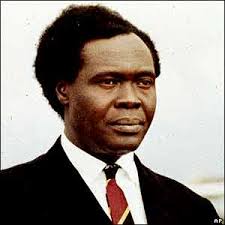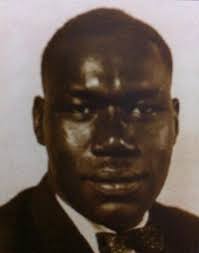As the country commemorates Heroes Day on June 9, it is important to also look back at other Ugandans who have made contributions to Uganda since Independence in 1962.
And, in serialized episodes of Powerful Voices’ the eagleonline will review 100 of the prominent and powerful players on Uganda’s socio-economic and political scene, some, dead or living, beginning with the 1960s.

1. Kabaka Fredrick Walugembe Mutesa II
The Kabaka of Buganda, Edward Frederick David William Walugembe Luwangula Mutebi Mutesa II was the first President of independent Uganda. King Freddie, as he was affectionately referred to, led Uganda from 1963 to 1966, when he was forced to flee the country after falling out with the then Prime Minister, Milton Obote. He died in exile in London in 1969 aged 45, and his remains were returned and buried in Uganda after Iddi Amin overthrew the government of Milton Obote, Uganda’s second president. Mutesa II reportedly had 12 wives and 21 children, among them the reigning Kabaka of Buganda, Ronald Muwenda Mutebi.

2. Apollo Milton Obote
The first post-Independence Prime Minister of Uganda in 1962, Obote was one of the founders of the Uganda Peoples Congress (UPC). Commonly known as AMO by the ‘Congressmen’, he is so far the only man to rule Uganda as Prime Minister and later President. He is also the only man who has ruled Uganda twice, from 1962 to 1971 and from 1980 to 1985. Both his regimes were ended by military coups orchestrated by his serving Army Commanders, Major General Iddi Amin and Lieutenant General Tito Okello Lutwa, respectively.
In 1971 Obote was overthrown as he attended the Commonwealth Summit in Singapore and lived his first exiled life in Tanzania, while on his second exile life he lived in Zambia.
The Patriarch of a political family, Obote’s wife Miria and son, Lira Municipality Member of Parliament Jimmy Akena have also at some time led the UPC, with the latter becoming party president just last week. Born in 1925, Obote studied at Busoga College Mwiri and later at Makerere College (University), where he was reportedly expelled for his radical ideas against colonialism.
He died aged 80 while undergoing treatment at a South African hospital in 2005 and was accorded a State Funeral. He was later buried at his ancestral home in Akokoro, Apac district. Obote is survived by the widow, Miria Kalule Obote, and five children.

3. Professor Yusuf Kironde Lule
He was the third President of Uganda, and ruled the country for 68 days, from April to June 1979. Lule, an academic-turned-politician replaced Iddi Amin. He was overthrown in a ‘palace coup’ by the National Consultative Council (NCC), the de facto post-Amin parliament which comprised of prominent Ugandans like Professors Edward Rugumayo, Omwony Ojok among others.
After his ouster, Lule was to form a rebel organization, the Uganda Freedom Fighters (UFF) but was later to join forces with current President Yoweri Museveni’s Peoples Resistance Army (PRA) in 1981, to form the National Resistance Movement/Army (NRM/A), and at one time becoming the Chairman of the organisation. He died in London aged 73, and was buried at Kololo, in the Heroes Corner.
4. Godfrey Lukongwa Binaisa Kayitiro (QC)

Born in 1922, Binaisa was the fourth president of Uganda for only 11 months, from June 1980 to May 1981. A lawyer, Binaisa was the first and only Ugandan to acquire the title Queens Counsel (QC), and was also the first indigenous Attorney General, from 1962 to 1968. He is most remembered for the ‘Pigeonhole Constitution’ of 1966 and also for his gaffe of sending then military strongman, Army Chief of Staff Brigadier David Oyite Ojok to Algeria as Ambassador in 1981. It is this move that led to his ouster. Binaisa died in 2010 at the age of 90, but this was not before he married an internet acquaintance, Japanese Tomoko Yamamoto. He had earlier lost his first wife, Irene Marjorie Kabamori from Tooro.

5. Benedicto Kagimu Mugumba Kiwanuka
Was the first indigenous pre-Independence Prime Minister of Uganda in 1961. Born in 1922, Kiwanuka, a British-trained lawyer, was the leader of the Democratic Party (DP). After the overthrow of Apollo Milton Obote by Iddi Amin in January 1971, Kiwanuka was made Chief Justice. He was to be killed by Amin in 1972, aged 50. One of his children, Maurice Kagimu Kiwanuka, was once a Member of Parliament representing Bukomansimbi constituency. The younger Kiwanuka is currently Uganda’s Ambassador to Nigeria.

6. William Wilberforce Kadhumbula Nadiope III
The second Kyabazinga of Busoga, William Wilberforce Kadhumbula Nadiope III became Uganda’s first Vice President under Milton Obote, from 1963 to 1966.
At home in Busoga, he was elected Kyabazinga twice, serving between 1949 to 1955 and between 1962 to 1966.
As Kyabazinga, Nadiope III is remembered for ending the colonial practice, where his subjects were required to supply rat tails to the colonialists to prove that they had killed a rat. This was in an effort to curb the onslaught of smallpox. His Kyabazingaship was cut short when kingdoms were abolished by Milton Obote in 1966.
His grandson, William Wilberforce Kadhumbula Gabula Nadiope IV, who was born in 1988, is the current Kyabazinga of Busoga.

7. Henry Waako Muloki
Like Kadhumbula Nadiope III, Henry Waako Muloki was twice the Kyabazinga of Busoga, first between 1955 and 1966 when the Prime Minister Milton Obote abolished kingdoms, and then from 1995 until he passed on in 2008, aged 87.

8. Brigadier Shaban Opolot
The first indigenous Commander of the Uganda Army, Brigadier Shaban Opolot joined the military in 1945, under the then Kings African Rifles (KAR). Brig Opolot is best remembered for taking a tough stance against Milton Obote’s intentions to abolish the Kingdoms in Uganda, and then particularly for refusing to lead an attack on Mmengo establishment at the Lubiri. He died in 2005 aged 86.

Abu Mayanja
Born in 1929, Abu Mayanja is one of the most prominent Ugandan politicians and he held influential offices in almost all post-Independence governments. He was also at one time a Minister of Education in the Buganda government, having earlier participated in the formation of Uganda National Congress (UNC), a pre-Independence political organization that also had big names like Ignatius Musaazi Kangaave and Milton Obote. He studied law at the University of Cambridge in the United Kingdom after being expelled from Makerere University College for engaging in political agitation to bring colonialism in Uganda to an end. He was also a pan-Africanist.
Mayanja died in 2005 aged 76 and is survived by wives and several children.

Eric Otema Allimadi
Born in 1929, Eric Otema Allimadi was the second Prime Minister of Uganda from 1980 to 1985, during Milton Obote’s second regime. Earlier, between 1979 and 1980 he had served as Foreign Minister. He died in 2001.

Adoko Nekyon
A cousin to former president Milton Obote, Al Haj Ali Akbar Adoko Nekyon was the first post-Independence Minister of Information, Broadcasting and Tourism in the 1960s. He also served as Minister for Health and Minister of Rehabilitation and Social Services between 1988 and 1980, under the NRM government.
Alex Ojera
Was a Minister of Information serving under the Obote 1 regime. He was killed in 1972 by Iddi Amin.

Basil Bataringaya
He was the internal affairs minister at the time Milton Obote was overthrown in 1971. A former Secretary General of the Democratic Party in the 1960s, Bataringaya also served as Minister for Local Government in the first self-governance regime of Benedicto Kiwanuka. He led the first cross-over of Parliamentarians, taking with him six other DP MPs to join the Uganda Peoples Congress, after falling out with DP party leader Kiwanuka. One of the earliest victims of regime change, Bataringaya was killed during Iddi Amin’s reign in 1972.
Boniface Byanyima
In his 90s, Boniface Byanyima is a retired politician who was a Democratic Party Member of Parliament in the 1960s, representing Ankole. Mzee Byanyima currently stays at his rural home in Ruti, Mbarara and is the father of another former fiery politician and current Oxfam International Executive Director Winnie Byanyima. Opposition stalwart Col. (rtd) Dr Kizza Besigye marries Winnie and together they have one son, Anselm.
John Babiiha
At the time of Obote’s ouster in January 1971 John Babiiha was the Vice President.
He was the second Vice President of Uganda, serving from 1967 to January 1971. Nothing much is remembered about him, however, a road in Kamowokya, a city suburb, is named after him.

Shaban Kirunda Nkutu
Born in 1930, Shaban Nkutu served as Minister of Works, Transport and Communications in the first post-Independence cabinet of the Milton Obote government, and later worked as Minister of Health between 1966 and 1967, during which time government constructed several referral hospitals across the country.
He was later to be killed during Iddi Amin’s regime in 1973, aged 43. He was reportedly related to one of Amin’s wives but this did not deter the latter from killing him. Nkutu belongs to one of the royal clans of Busoga
Nkutu’s remains were recently exhumed and given a decent burial at his ancestral home in Bugweri County.

Paulo Muwanga
Born in 1921, Paulo Muwanga was the Vice President of Uganda between December 1980 and July 1985. Earlier, between May and December 1980, Muwanga was the Chairman of both the Presidential Commission and the all-powerful Military Commission, the de facto presidency, where he was deputized by current Ugandan President Yoweri Museveni. The two men were later to fall out after Muwanga supervised an election which Museveni said was rigged.
In a surprise move, after the overthrow of Obote in 1985, Muwanga, immediate former Vice President at the time was named Executive Prime Minister by the ruling military junta of Tito Okello Lutwa and Lt. Gen. Bazilio Olara Okello.
Muwanga also worked with the Foreign Service in several Ugandan missions abroad including France, where he reportedly sold off all Embassy property during the Amin reign in the 70s and fled to the United Kingdom.
He died in 1991 aged 70.

Mustafa Adrisi
Born in 1922, Gen Mustapha Adrisi was the third Vice President of Uganda, serving under Iddi Amin between 1978 and 1979. Until his death in 2013, Gen Adrisi was living a quiet life in his home town of Arua. He is reportedly survived by several wives and children.

Luke Kercan Ofungi
Born in Okoro County, Nebbi District in 1934, Luke Kercan Ofungi joined the Uganda Police in 1954 as a Police Constable but rose through the ranks, thrice becoming the Inspector General and serving under four Presidents: Iddi Amin, Apollo Milton Obote, Tito Okello and Yoweri Museveni. He also served as the Deputy Inspector General of Police during the 11 month government of Godfrey Lukongwa Binaisa, the second President in the post-Iddi Amin era.
Possibly one of the most decorated IGPs, Ofungi died in 1990 aged 56 and was accorded a state funeral.
Interestingly, after his death he was accorded a 24-month retrospective posthumous contract to serve as IGP for the ‘fifth term’, effective 1989.

Joseph Mary Mubiru
An Economist, in 1966 at only 37 years Joseph Mary Mubiru was the first Governor of the Bank of Uganda, having worked with the United Nations at the beginning of his career. He also worked with the defunct Uganda Commercial Bank (UCB) as its Chief Executive. He was also instrumental in establishing the African Development Bank (ADB) in 1964. Mubiru lost his job at the central bank when Iddi Amin took over government in 1971, and it is believed he was later killed on the orders of the former president.
Today, his legacy still lives on and he is remembered through the annual Joseph Mubiru Memorial lectures, organized by the Bank of Uganda.
John Robert Elangot
An Economist, John Robert Elangot served in various capacities in the 1960s and 1970s, rising to become the Governor of the Bank of Uganda. Before that he had also worked as the Deputy Governor. He is now retired.
Leo Kibirango
An Economist also, Leo Kibirango served as the Governor of the Bank of Uganda from 1981 to 1986. After leaving the central bank, Kibirango had a stint with the Capital Markets Authority, as Chief Executive.
Charles Kikonyogo Nyonyntono
An Economist, Charles Kikonyogo Nyonyintono was a Governor of the Bank of Uganda in the late 70s, immediately preceding Leo Kibirango.









